Management Research Report: Approaches, Methods, and Processes
VerifiedAdded on 2021/06/17
|13
|2236
|138
Report
AI Summary
This report comprehensively examines management research, differentiating between quantitative and qualitative approaches. It details the characteristics, strengths, and applications of each method, highlighting their similarities and differences. The report also explores inductive and deductive approaches, outlining their advantages, disadvantages, and applications in research. Furthermore, it defines scientific research, its key characteristics (purposiveness, objectivity, generalizability, testability, and replicability), and acknowledges its limitations. The report then outlines the processes involved in both quantitative and qualitative research, including data collection, analysis, and interpretation. Finally, it compares and contrasts these two approaches, emphasizing their distinct methodologies and the types of questions they are best suited to answer, concluding with a summary of the key considerations in selecting the appropriate research method.
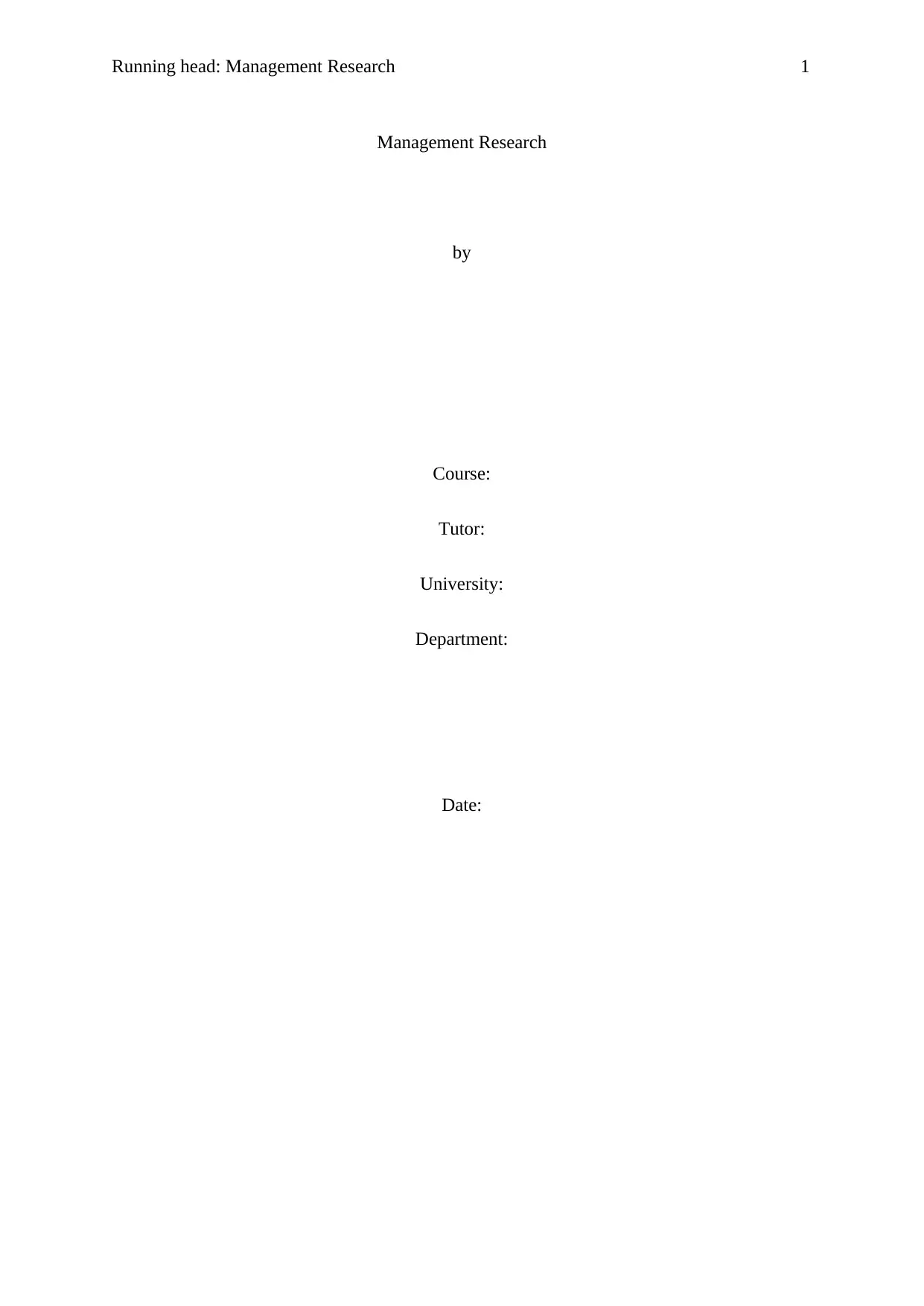
Running head: Management Research 1
Management Research
by
Course:
Tutor:
University:
Department:
Date:
Management Research
by
Course:
Tutor:
University:
Department:
Date:
Paraphrase This Document
Need a fresh take? Get an instant paraphrase of this document with our AI Paraphraser
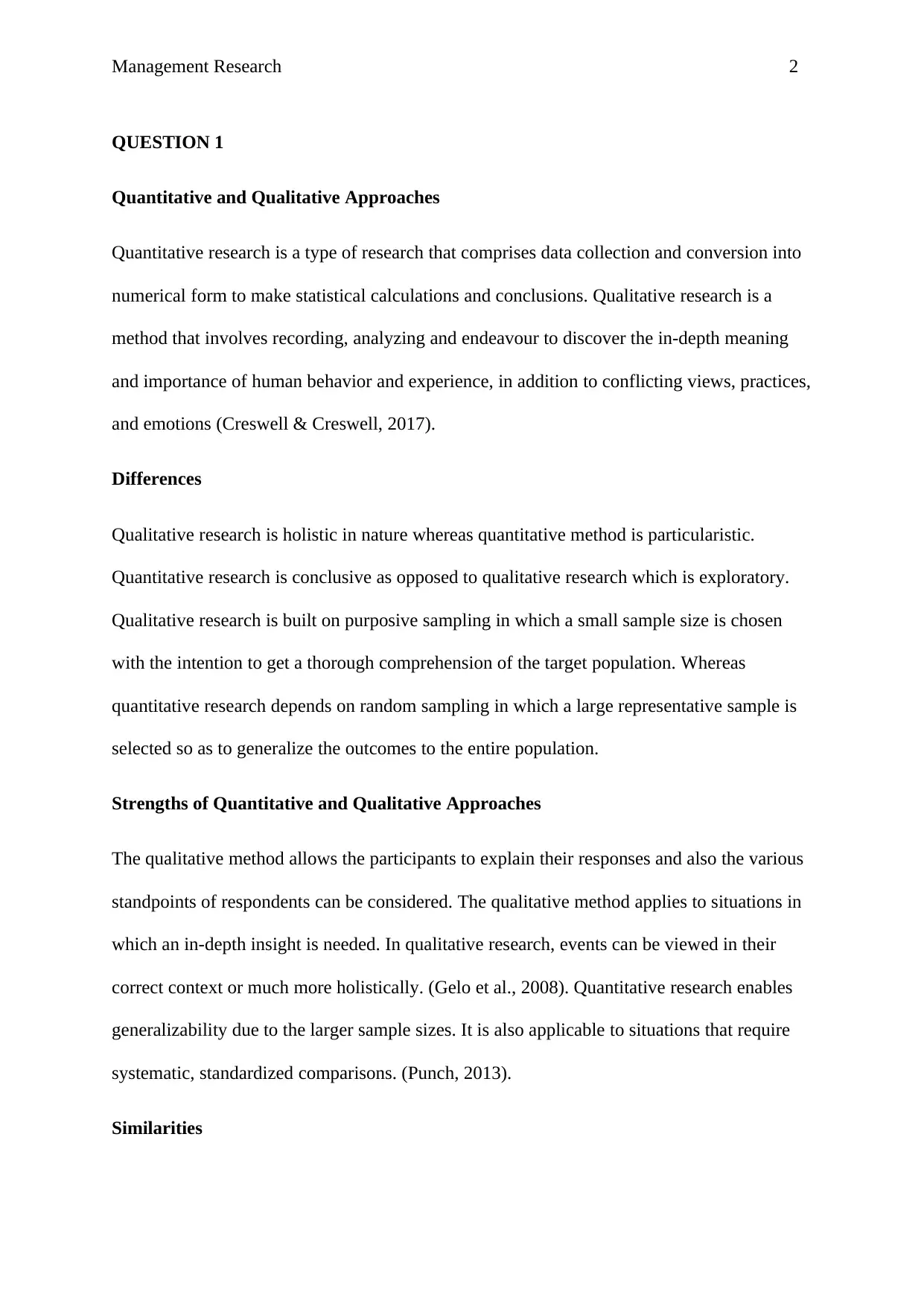
Management Research 2
QUESTION 1
Quantitative and Qualitative Approaches
Quantitative research is a type of research that comprises data collection and conversion into
numerical form to make statistical calculations and conclusions. Qualitative research is a
method that involves recording, analyzing and endeavour to discover the in-depth meaning
and importance of human behavior and experience, in addition to conflicting views, practices,
and emotions (Creswell & Creswell, 2017).
Differences
Qualitative research is holistic in nature whereas quantitative method is particularistic.
Quantitative research is conclusive as opposed to qualitative research which is exploratory.
Qualitative research is built on purposive sampling in which a small sample size is chosen
with the intention to get a thorough comprehension of the target population. Whereas
quantitative research depends on random sampling in which a large representative sample is
selected so as to generalize the outcomes to the entire population.
Strengths of Quantitative and Qualitative Approaches
The qualitative method allows the participants to explain their responses and also the various
standpoints of respondents can be considered. The qualitative method applies to situations in
which an in-depth insight is needed. In qualitative research, events can be viewed in their
correct context or much more holistically. (Gelo et al., 2008). Quantitative research enables
generalizability due to the larger sample sizes. It is also applicable to situations that require
systematic, standardized comparisons. (Punch, 2013).
Similarities
QUESTION 1
Quantitative and Qualitative Approaches
Quantitative research is a type of research that comprises data collection and conversion into
numerical form to make statistical calculations and conclusions. Qualitative research is a
method that involves recording, analyzing and endeavour to discover the in-depth meaning
and importance of human behavior and experience, in addition to conflicting views, practices,
and emotions (Creswell & Creswell, 2017).
Differences
Qualitative research is holistic in nature whereas quantitative method is particularistic.
Quantitative research is conclusive as opposed to qualitative research which is exploratory.
Qualitative research is built on purposive sampling in which a small sample size is chosen
with the intention to get a thorough comprehension of the target population. Whereas
quantitative research depends on random sampling in which a large representative sample is
selected so as to generalize the outcomes to the entire population.
Strengths of Quantitative and Qualitative Approaches
The qualitative method allows the participants to explain their responses and also the various
standpoints of respondents can be considered. The qualitative method applies to situations in
which an in-depth insight is needed. In qualitative research, events can be viewed in their
correct context or much more holistically. (Gelo et al., 2008). Quantitative research enables
generalizability due to the larger sample sizes. It is also applicable to situations that require
systematic, standardized comparisons. (Punch, 2013).
Similarities
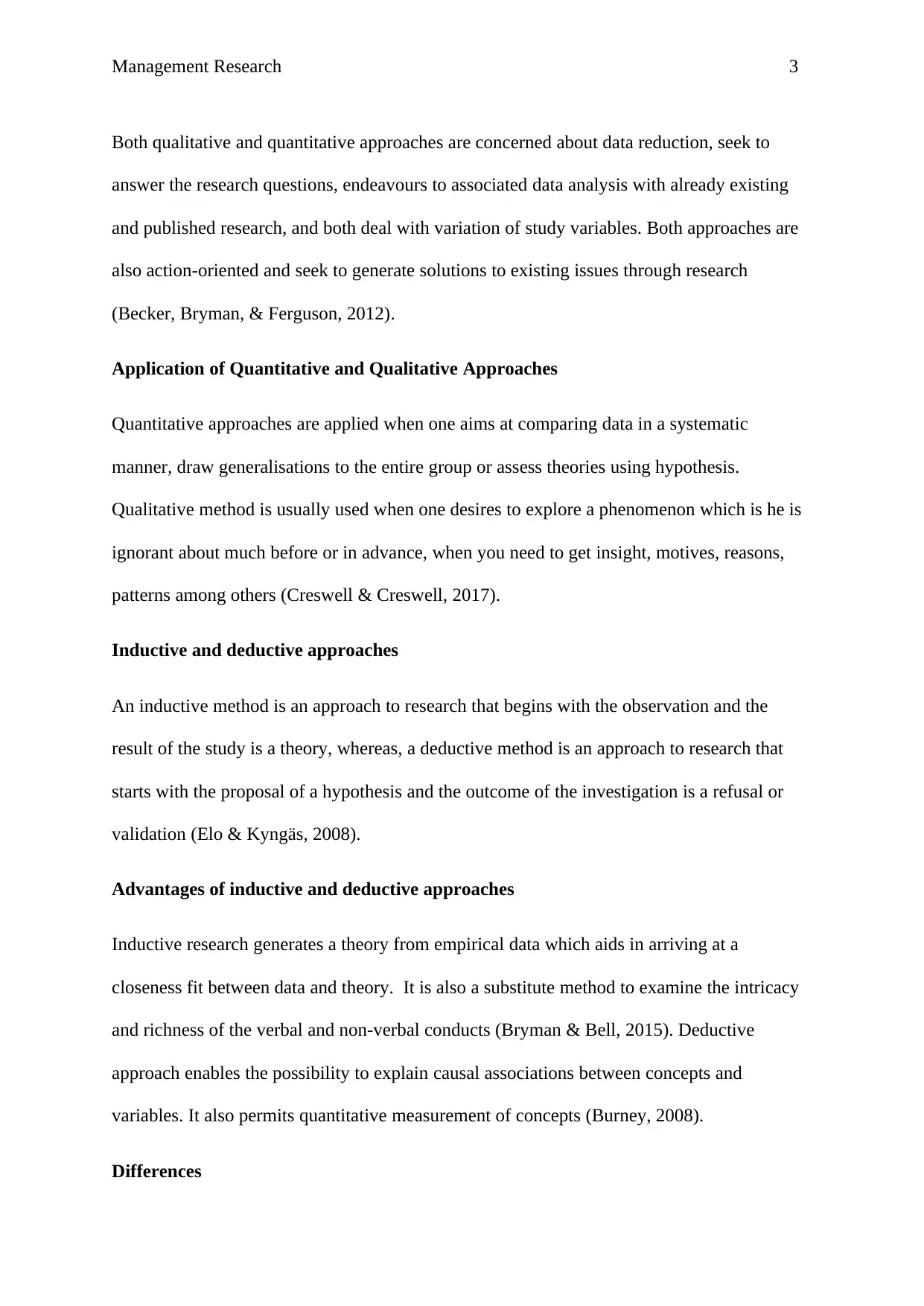
Management Research 3
Both qualitative and quantitative approaches are concerned about data reduction, seek to
answer the research questions, endeavours to associated data analysis with already existing
and published research, and both deal with variation of study variables. Both approaches are
also action-oriented and seek to generate solutions to existing issues through research
(Becker, Bryman, & Ferguson, 2012).
Application of Quantitative and Qualitative Approaches
Quantitative approaches are applied when one aims at comparing data in a systematic
manner, draw generalisations to the entire group or assess theories using hypothesis.
Qualitative method is usually used when one desires to explore a phenomenon which is he is
ignorant about much before or in advance, when you need to get insight, motives, reasons,
patterns among others (Creswell & Creswell, 2017).
Inductive and deductive approaches
An inductive method is an approach to research that begins with the observation and the
result of the study is a theory, whereas, a deductive method is an approach to research that
starts with the proposal of a hypothesis and the outcome of the investigation is a refusal or
validation (Elo & Kyngäs, 2008).
Advantages of inductive and deductive approaches
Inductive research generates a theory from empirical data which aids in arriving at a
closeness fit between data and theory. It is also a substitute method to examine the intricacy
and richness of the verbal and non-verbal conducts (Bryman & Bell, 2015). Deductive
approach enables the possibility to explain causal associations between concepts and
variables. It also permits quantitative measurement of concepts (Burney, 2008).
Differences
Both qualitative and quantitative approaches are concerned about data reduction, seek to
answer the research questions, endeavours to associated data analysis with already existing
and published research, and both deal with variation of study variables. Both approaches are
also action-oriented and seek to generate solutions to existing issues through research
(Becker, Bryman, & Ferguson, 2012).
Application of Quantitative and Qualitative Approaches
Quantitative approaches are applied when one aims at comparing data in a systematic
manner, draw generalisations to the entire group or assess theories using hypothesis.
Qualitative method is usually used when one desires to explore a phenomenon which is he is
ignorant about much before or in advance, when you need to get insight, motives, reasons,
patterns among others (Creswell & Creswell, 2017).
Inductive and deductive approaches
An inductive method is an approach to research that begins with the observation and the
result of the study is a theory, whereas, a deductive method is an approach to research that
starts with the proposal of a hypothesis and the outcome of the investigation is a refusal or
validation (Elo & Kyngäs, 2008).
Advantages of inductive and deductive approaches
Inductive research generates a theory from empirical data which aids in arriving at a
closeness fit between data and theory. It is also a substitute method to examine the intricacy
and richness of the verbal and non-verbal conducts (Bryman & Bell, 2015). Deductive
approach enables the possibility to explain causal associations between concepts and
variables. It also permits quantitative measurement of concepts (Burney, 2008).
Differences
⊘ This is a preview!⊘
Do you want full access?
Subscribe today to unlock all pages.

Trusted by 1+ million students worldwide
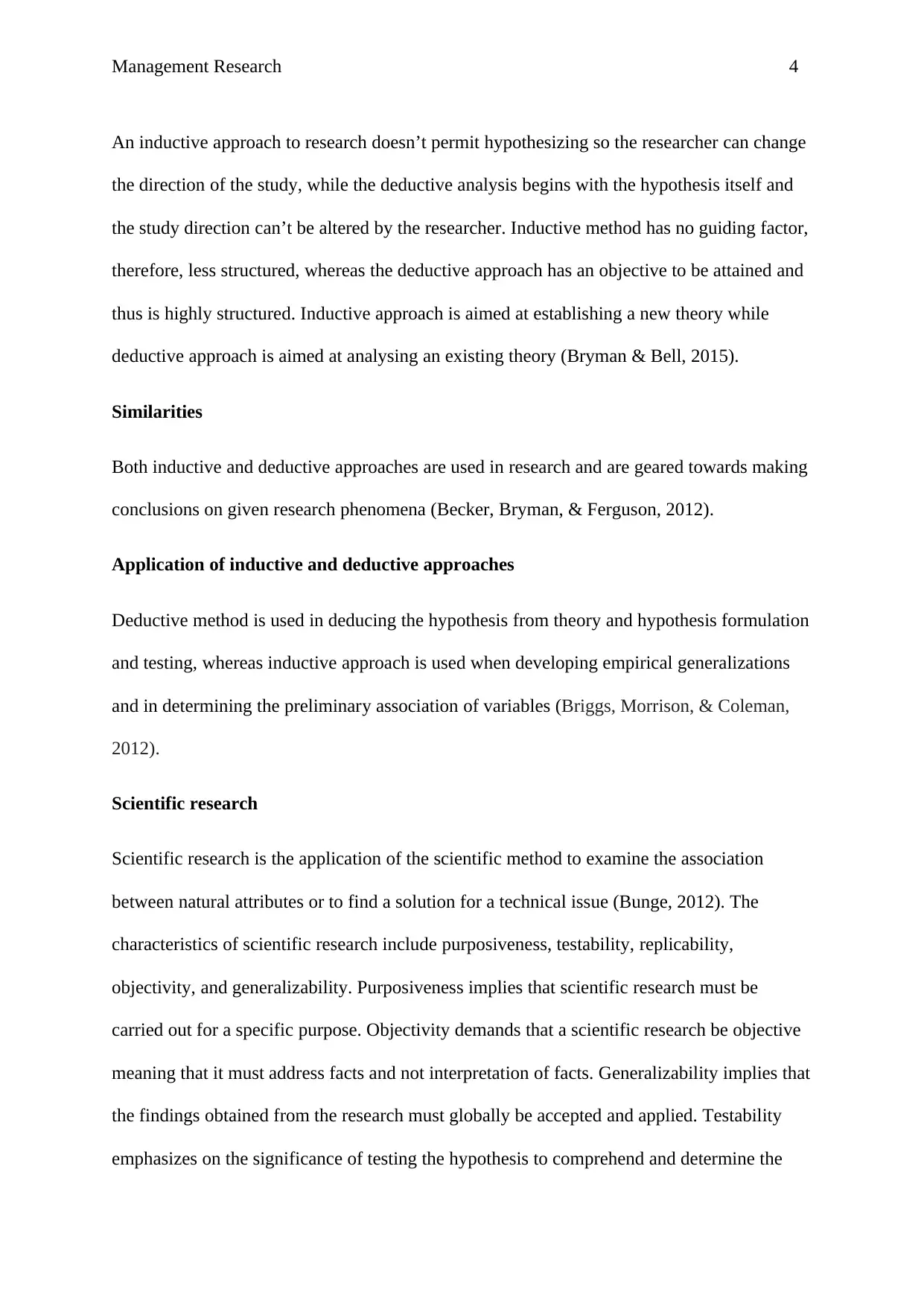
Management Research 4
An inductive approach to research doesn’t permit hypothesizing so the researcher can change
the direction of the study, while the deductive analysis begins with the hypothesis itself and
the study direction can’t be altered by the researcher. Inductive method has no guiding factor,
therefore, less structured, whereas the deductive approach has an objective to be attained and
thus is highly structured. Inductive approach is aimed at establishing a new theory while
deductive approach is aimed at analysing an existing theory (Bryman & Bell, 2015).
Similarities
Both inductive and deductive approaches are used in research and are geared towards making
conclusions on given research phenomena (Becker, Bryman, & Ferguson, 2012).
Application of inductive and deductive approaches
Deductive method is used in deducing the hypothesis from theory and hypothesis formulation
and testing, whereas inductive approach is used when developing empirical generalizations
and in determining the preliminary association of variables (Briggs, Morrison, & Coleman,
2012).
Scientific research
Scientific research is the application of the scientific method to examine the association
between natural attributes or to find a solution for a technical issue (Bunge, 2012). The
characteristics of scientific research include purposiveness, testability, replicability,
objectivity, and generalizability. Purposiveness implies that scientific research must be
carried out for a specific purpose. Objectivity demands that a scientific research be objective
meaning that it must address facts and not interpretation of facts. Generalizability implies that
the findings obtained from the research must globally be accepted and applied. Testability
emphasizes on the significance of testing the hypothesis to comprehend and determine the
An inductive approach to research doesn’t permit hypothesizing so the researcher can change
the direction of the study, while the deductive analysis begins with the hypothesis itself and
the study direction can’t be altered by the researcher. Inductive method has no guiding factor,
therefore, less structured, whereas the deductive approach has an objective to be attained and
thus is highly structured. Inductive approach is aimed at establishing a new theory while
deductive approach is aimed at analysing an existing theory (Bryman & Bell, 2015).
Similarities
Both inductive and deductive approaches are used in research and are geared towards making
conclusions on given research phenomena (Becker, Bryman, & Ferguson, 2012).
Application of inductive and deductive approaches
Deductive method is used in deducing the hypothesis from theory and hypothesis formulation
and testing, whereas inductive approach is used when developing empirical generalizations
and in determining the preliminary association of variables (Briggs, Morrison, & Coleman,
2012).
Scientific research
Scientific research is the application of the scientific method to examine the association
between natural attributes or to find a solution for a technical issue (Bunge, 2012). The
characteristics of scientific research include purposiveness, testability, replicability,
objectivity, and generalizability. Purposiveness implies that scientific research must be
carried out for a specific purpose. Objectivity demands that a scientific research be objective
meaning that it must address facts and not interpretation of facts. Generalizability implies that
the findings obtained from the research must globally be accepted and applied. Testability
emphasizes on the significance of testing the hypothesis to comprehend and determine the
Paraphrase This Document
Need a fresh take? Get an instant paraphrase of this document with our AI Paraphraser
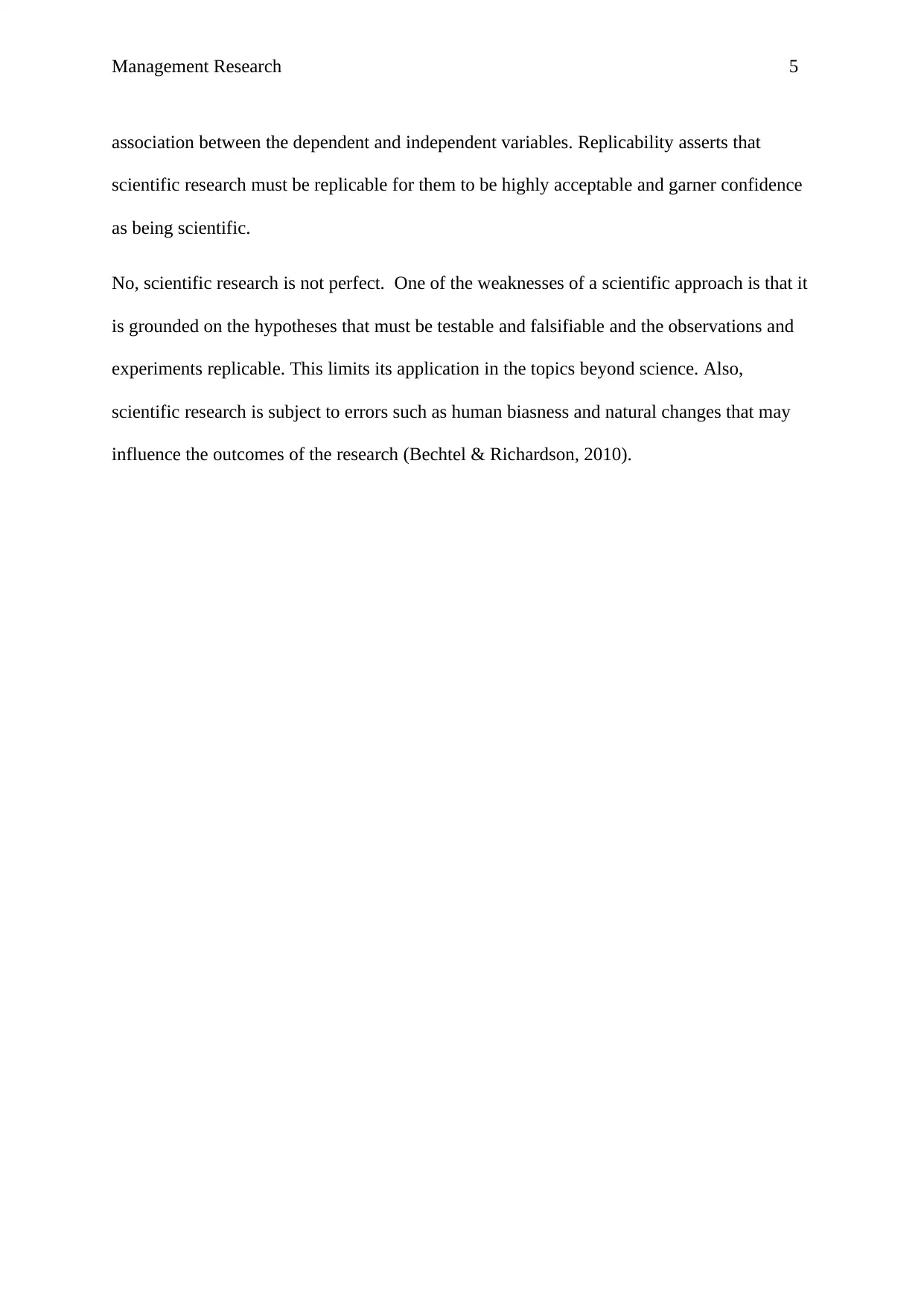
Management Research 5
association between the dependent and independent variables. Replicability asserts that
scientific research must be replicable for them to be highly acceptable and garner confidence
as being scientific.
No, scientific research is not perfect. One of the weaknesses of a scientific approach is that it
is grounded on the hypotheses that must be testable and falsifiable and the observations and
experiments replicable. This limits its application in the topics beyond science. Also,
scientific research is subject to errors such as human biasness and natural changes that may
influence the outcomes of the research (Bechtel & Richardson, 2010).
association between the dependent and independent variables. Replicability asserts that
scientific research must be replicable for them to be highly acceptable and garner confidence
as being scientific.
No, scientific research is not perfect. One of the weaknesses of a scientific approach is that it
is grounded on the hypotheses that must be testable and falsifiable and the observations and
experiments replicable. This limits its application in the topics beyond science. Also,
scientific research is subject to errors such as human biasness and natural changes that may
influence the outcomes of the research (Bechtel & Richardson, 2010).
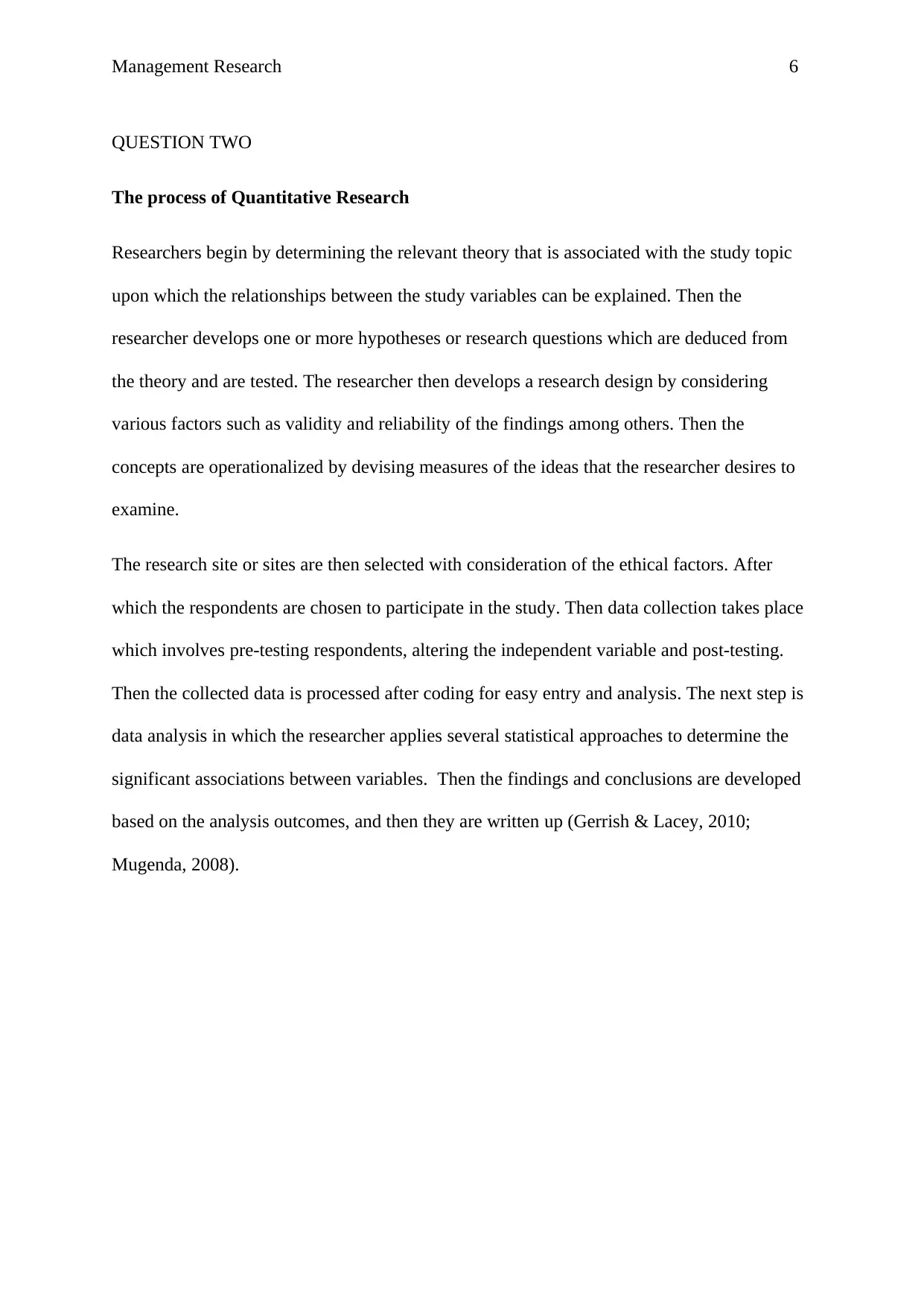
Management Research 6
QUESTION TWO
The process of Quantitative Research
Researchers begin by determining the relevant theory that is associated with the study topic
upon which the relationships between the study variables can be explained. Then the
researcher develops one or more hypotheses or research questions which are deduced from
the theory and are tested. The researcher then develops a research design by considering
various factors such as validity and reliability of the findings among others. Then the
concepts are operationalized by devising measures of the ideas that the researcher desires to
examine.
The research site or sites are then selected with consideration of the ethical factors. After
which the respondents are chosen to participate in the study. Then data collection takes place
which involves pre-testing respondents, altering the independent variable and post-testing.
Then the collected data is processed after coding for easy entry and analysis. The next step is
data analysis in which the researcher applies several statistical approaches to determine the
significant associations between variables. Then the findings and conclusions are developed
based on the analysis outcomes, and then they are written up (Gerrish & Lacey, 2010;
Mugenda, 2008).
QUESTION TWO
The process of Quantitative Research
Researchers begin by determining the relevant theory that is associated with the study topic
upon which the relationships between the study variables can be explained. Then the
researcher develops one or more hypotheses or research questions which are deduced from
the theory and are tested. The researcher then develops a research design by considering
various factors such as validity and reliability of the findings among others. Then the
concepts are operationalized by devising measures of the ideas that the researcher desires to
examine.
The research site or sites are then selected with consideration of the ethical factors. After
which the respondents are chosen to participate in the study. Then data collection takes place
which involves pre-testing respondents, altering the independent variable and post-testing.
Then the collected data is processed after coding for easy entry and analysis. The next step is
data analysis in which the researcher applies several statistical approaches to determine the
significant associations between variables. Then the findings and conclusions are developed
based on the analysis outcomes, and then they are written up (Gerrish & Lacey, 2010;
Mugenda, 2008).
⊘ This is a preview!⊘
Do you want full access?
Subscribe today to unlock all pages.

Trusted by 1+ million students worldwide
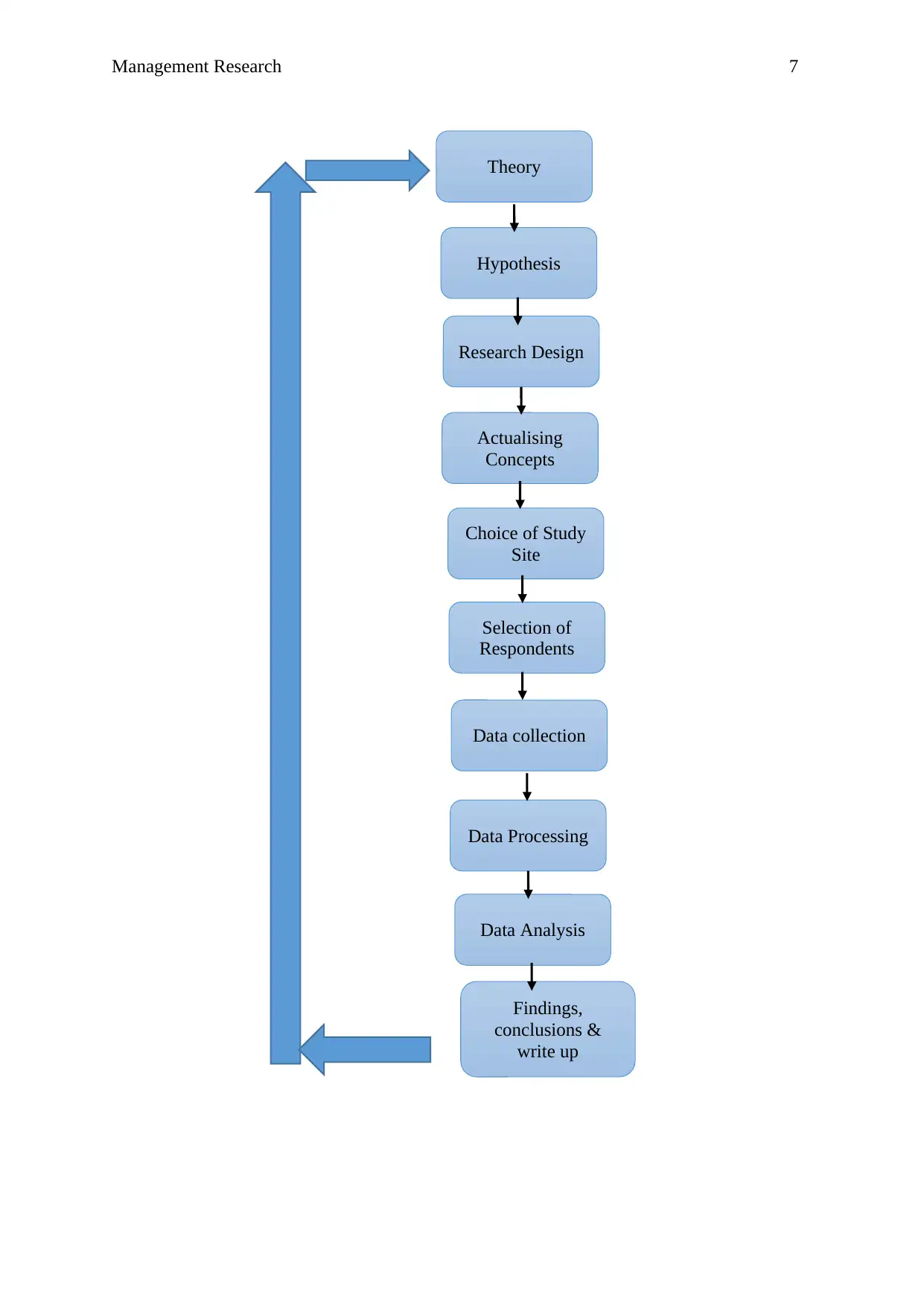
Management Research 7
Theory
Hypothesis
Research Design
Actualising
Concepts
Choice of Study
Site
Selection of
Respondents
Data collection
Data Processing
Data Analysis
Findings,
conclusions &
write up
Theory
Hypothesis
Research Design
Actualising
Concepts
Choice of Study
Site
Selection of
Respondents
Data collection
Data Processing
Data Analysis
Findings,
conclusions &
write up
Paraphrase This Document
Need a fresh take? Get an instant paraphrase of this document with our AI Paraphraser
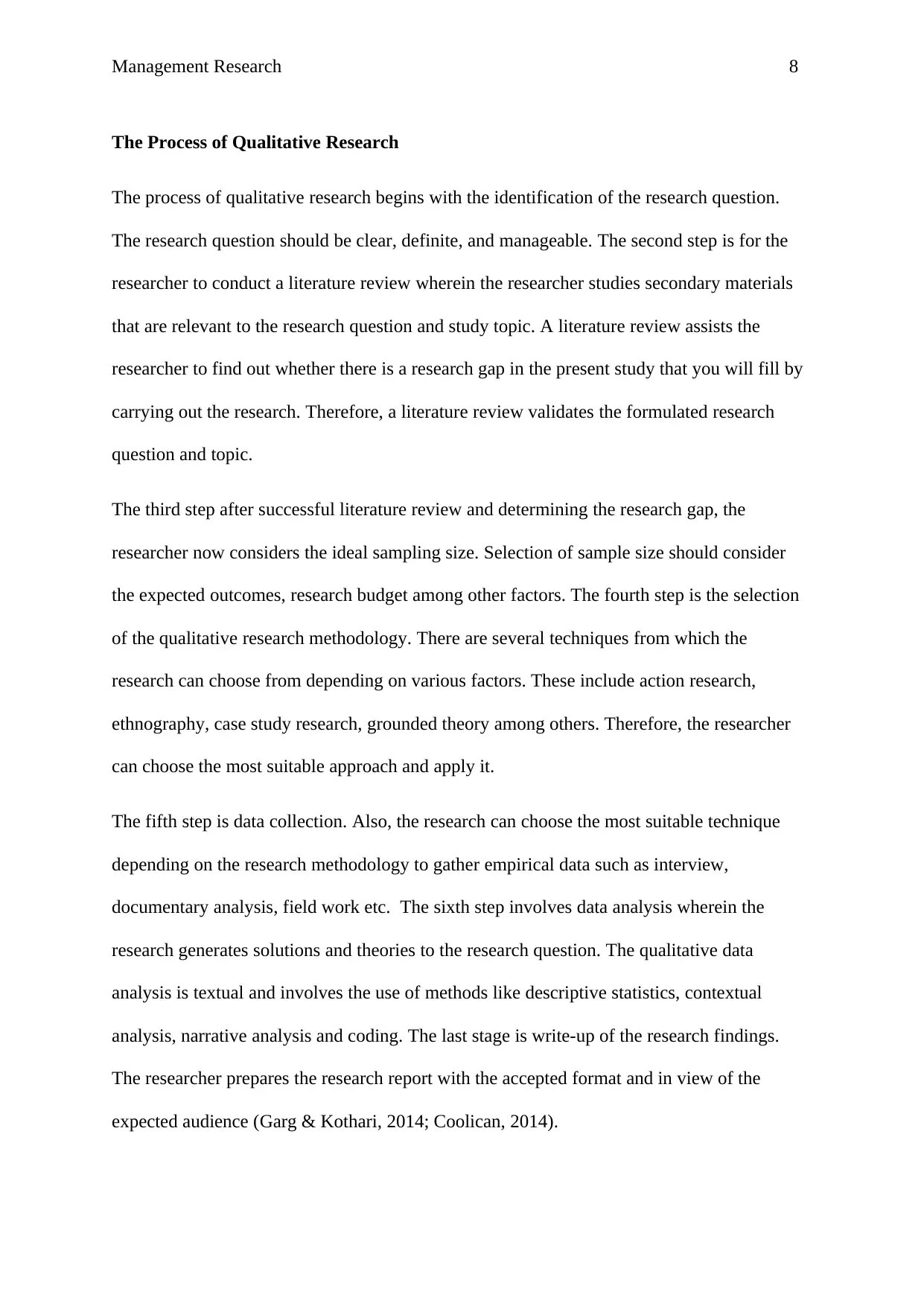
Management Research 8
The Process of Qualitative Research
The process of qualitative research begins with the identification of the research question.
The research question should be clear, definite, and manageable. The second step is for the
researcher to conduct a literature review wherein the researcher studies secondary materials
that are relevant to the research question and study topic. A literature review assists the
researcher to find out whether there is a research gap in the present study that you will fill by
carrying out the research. Therefore, a literature review validates the formulated research
question and topic.
The third step after successful literature review and determining the research gap, the
researcher now considers the ideal sampling size. Selection of sample size should consider
the expected outcomes, research budget among other factors. The fourth step is the selection
of the qualitative research methodology. There are several techniques from which the
research can choose from depending on various factors. These include action research,
ethnography, case study research, grounded theory among others. Therefore, the researcher
can choose the most suitable approach and apply it.
The fifth step is data collection. Also, the research can choose the most suitable technique
depending on the research methodology to gather empirical data such as interview,
documentary analysis, field work etc. The sixth step involves data analysis wherein the
research generates solutions and theories to the research question. The qualitative data
analysis is textual and involves the use of methods like descriptive statistics, contextual
analysis, narrative analysis and coding. The last stage is write-up of the research findings.
The researcher prepares the research report with the accepted format and in view of the
expected audience (Garg & Kothari, 2014; Coolican, 2014).
The Process of Qualitative Research
The process of qualitative research begins with the identification of the research question.
The research question should be clear, definite, and manageable. The second step is for the
researcher to conduct a literature review wherein the researcher studies secondary materials
that are relevant to the research question and study topic. A literature review assists the
researcher to find out whether there is a research gap in the present study that you will fill by
carrying out the research. Therefore, a literature review validates the formulated research
question and topic.
The third step after successful literature review and determining the research gap, the
researcher now considers the ideal sampling size. Selection of sample size should consider
the expected outcomes, research budget among other factors. The fourth step is the selection
of the qualitative research methodology. There are several techniques from which the
research can choose from depending on various factors. These include action research,
ethnography, case study research, grounded theory among others. Therefore, the researcher
can choose the most suitable approach and apply it.
The fifth step is data collection. Also, the research can choose the most suitable technique
depending on the research methodology to gather empirical data such as interview,
documentary analysis, field work etc. The sixth step involves data analysis wherein the
research generates solutions and theories to the research question. The qualitative data
analysis is textual and involves the use of methods like descriptive statistics, contextual
analysis, narrative analysis and coding. The last stage is write-up of the research findings.
The researcher prepares the research report with the accepted format and in view of the
expected audience (Garg & Kothari, 2014; Coolican, 2014).
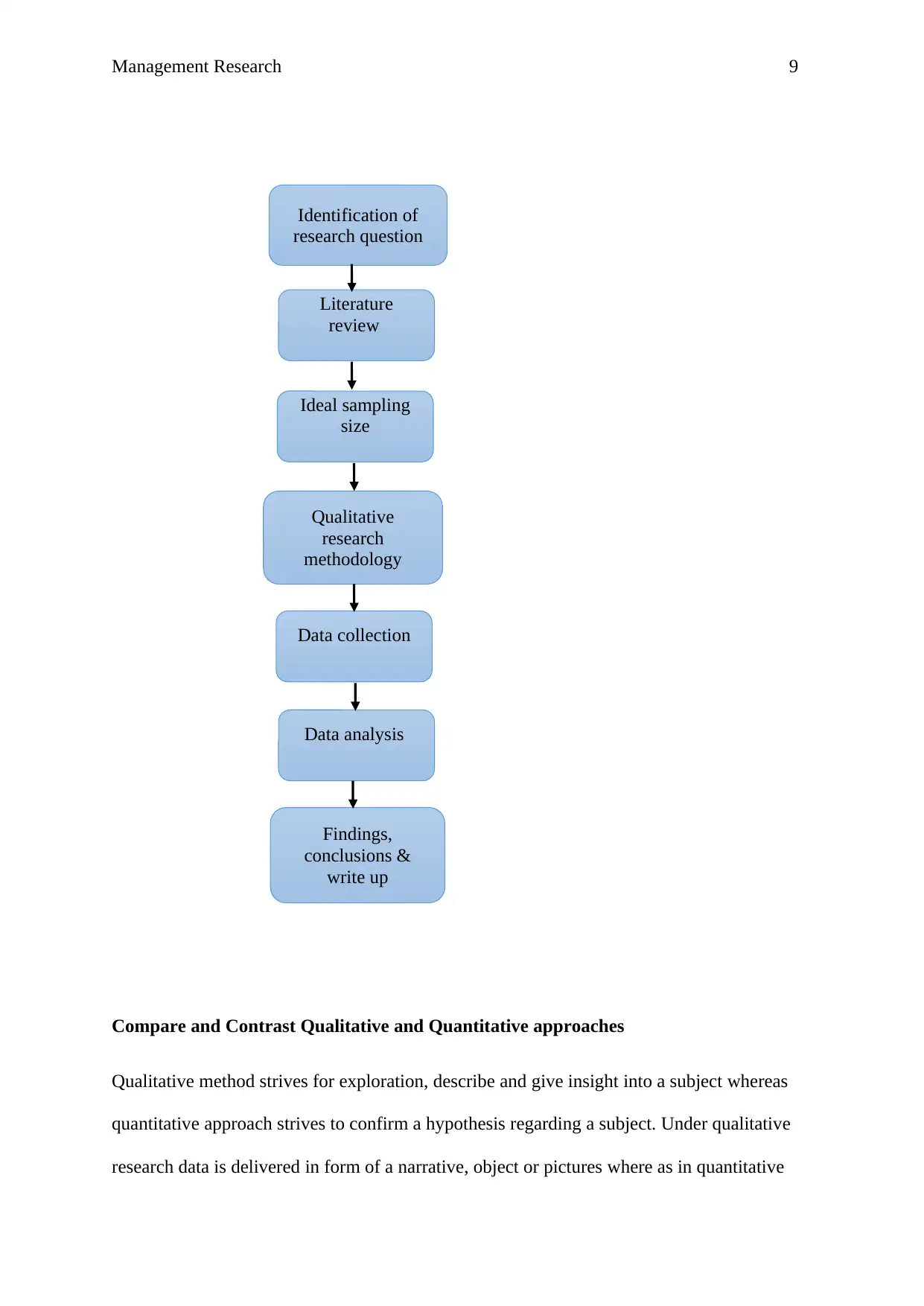
Management Research 9
Compare and Contrast Qualitative and Quantitative approaches
Qualitative method strives for exploration, describe and give insight into a subject whereas
quantitative approach strives to confirm a hypothesis regarding a subject. Under qualitative
research data is delivered in form of a narrative, object or pictures where as in quantitative
Identification of
research question
Literature
review
Ideal sampling
size
Qualitative
research
methodology
Data collection
Data analysis
Findings,
conclusions &
write up
Compare and Contrast Qualitative and Quantitative approaches
Qualitative method strives for exploration, describe and give insight into a subject whereas
quantitative approach strives to confirm a hypothesis regarding a subject. Under qualitative
research data is delivered in form of a narrative, object or pictures where as in quantitative
Identification of
research question
Literature
review
Ideal sampling
size
Qualitative
research
methodology
Data collection
Data analysis
Findings,
conclusions &
write up
⊘ This is a preview!⊘
Do you want full access?
Subscribe today to unlock all pages.

Trusted by 1+ million students worldwide
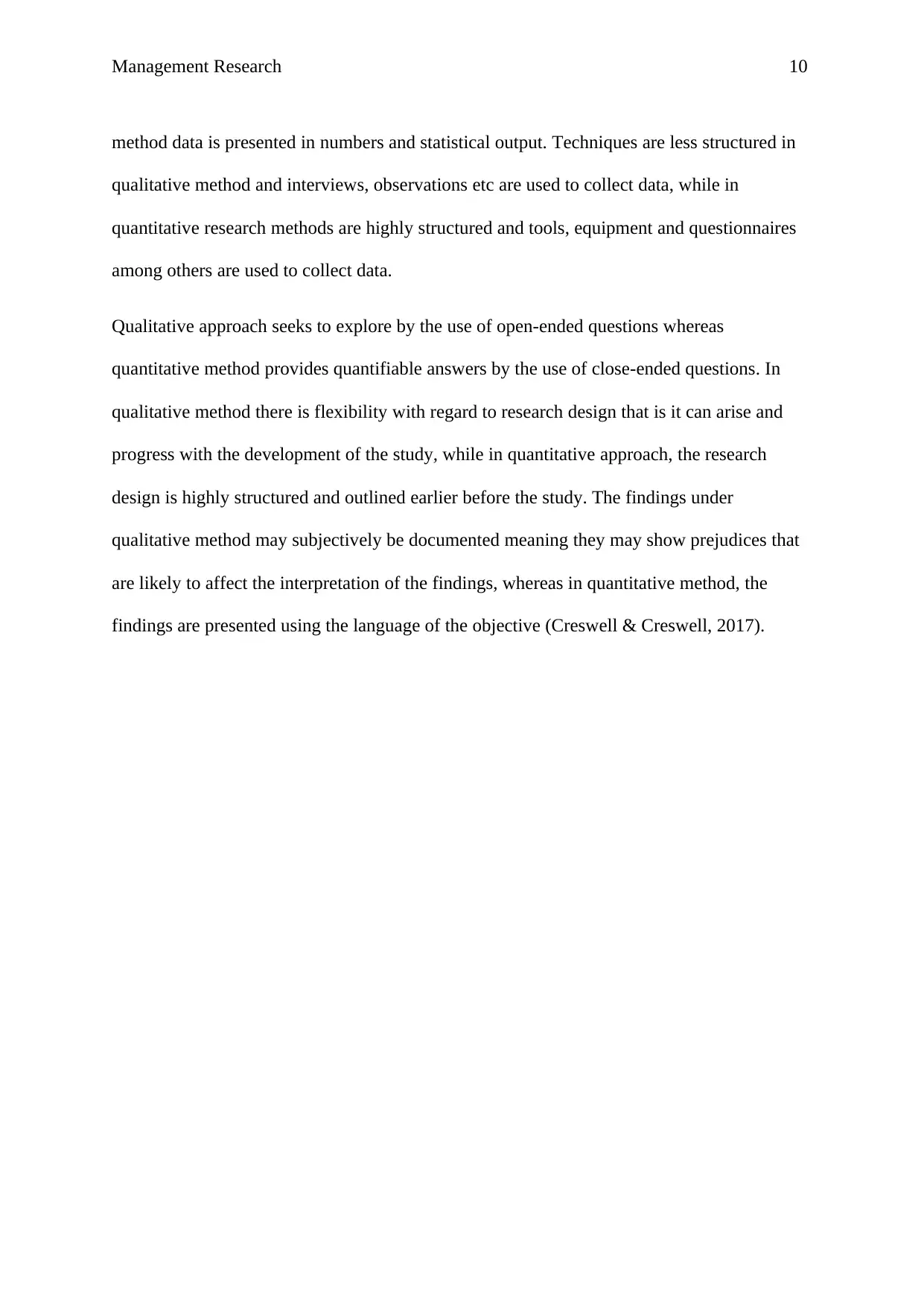
Management Research 10
method data is presented in numbers and statistical output. Techniques are less structured in
qualitative method and interviews, observations etc are used to collect data, while in
quantitative research methods are highly structured and tools, equipment and questionnaires
among others are used to collect data.
Qualitative approach seeks to explore by the use of open-ended questions whereas
quantitative method provides quantifiable answers by the use of close-ended questions. In
qualitative method there is flexibility with regard to research design that is it can arise and
progress with the development of the study, while in quantitative approach, the research
design is highly structured and outlined earlier before the study. The findings under
qualitative method may subjectively be documented meaning they may show prejudices that
are likely to affect the interpretation of the findings, whereas in quantitative method, the
findings are presented using the language of the objective (Creswell & Creswell, 2017).
method data is presented in numbers and statistical output. Techniques are less structured in
qualitative method and interviews, observations etc are used to collect data, while in
quantitative research methods are highly structured and tools, equipment and questionnaires
among others are used to collect data.
Qualitative approach seeks to explore by the use of open-ended questions whereas
quantitative method provides quantifiable answers by the use of close-ended questions. In
qualitative method there is flexibility with regard to research design that is it can arise and
progress with the development of the study, while in quantitative approach, the research
design is highly structured and outlined earlier before the study. The findings under
qualitative method may subjectively be documented meaning they may show prejudices that
are likely to affect the interpretation of the findings, whereas in quantitative method, the
findings are presented using the language of the objective (Creswell & Creswell, 2017).
Paraphrase This Document
Need a fresh take? Get an instant paraphrase of this document with our AI Paraphraser
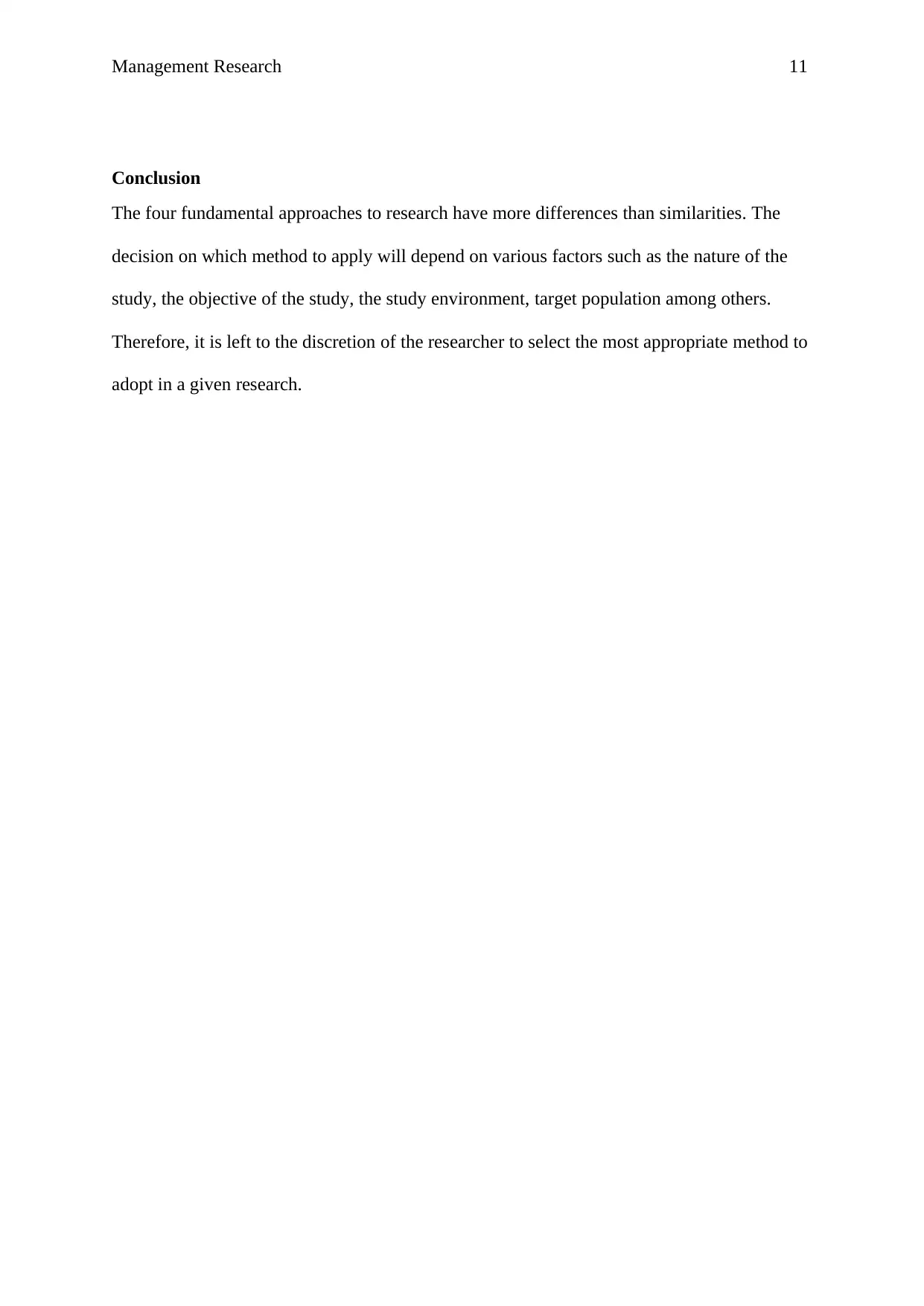
Management Research 11
Conclusion
The four fundamental approaches to research have more differences than similarities. The
decision on which method to apply will depend on various factors such as the nature of the
study, the objective of the study, the study environment, target population among others.
Therefore, it is left to the discretion of the researcher to select the most appropriate method to
adopt in a given research.
Conclusion
The four fundamental approaches to research have more differences than similarities. The
decision on which method to apply will depend on various factors such as the nature of the
study, the objective of the study, the study environment, target population among others.
Therefore, it is left to the discretion of the researcher to select the most appropriate method to
adopt in a given research.
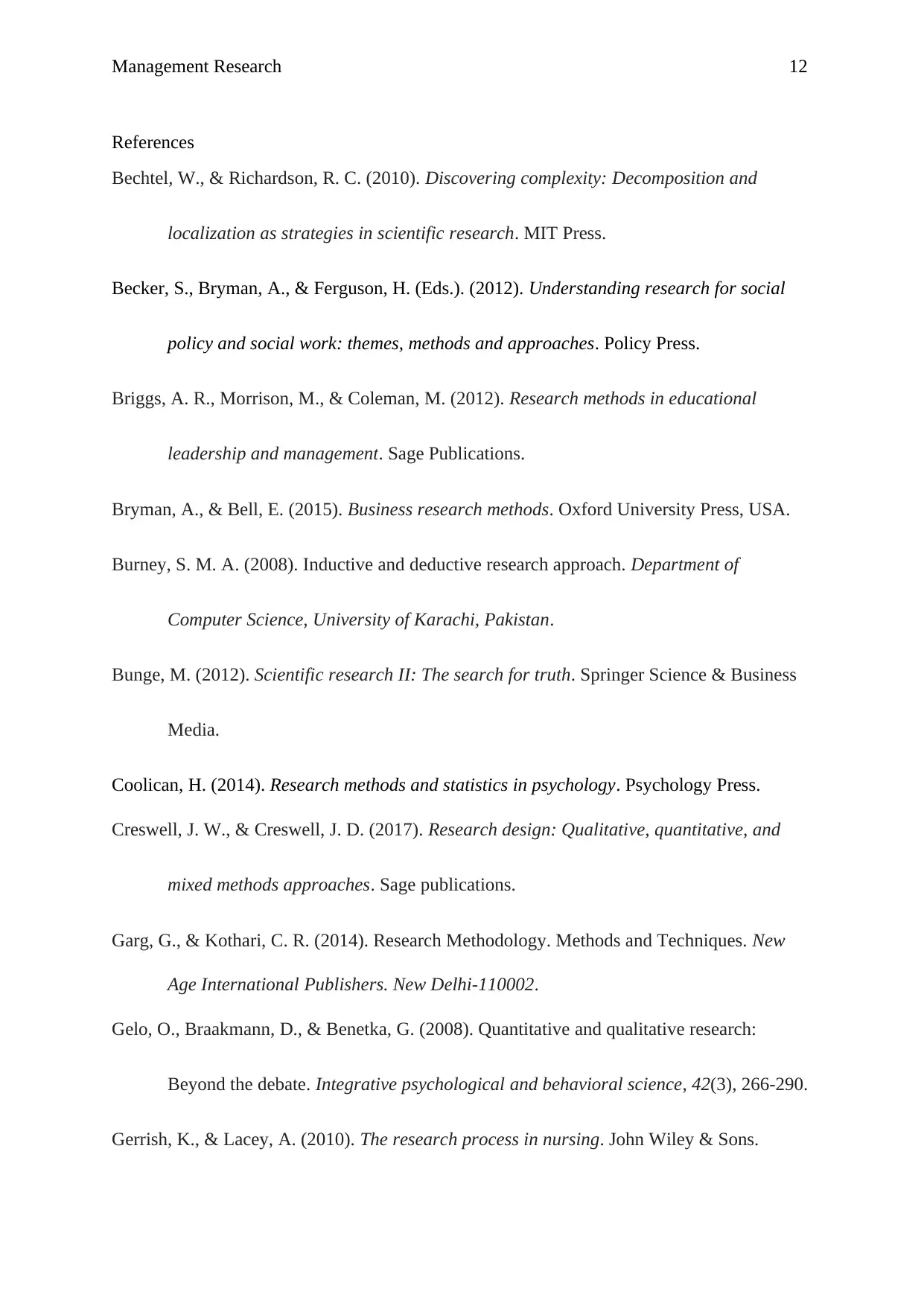
Management Research 12
References
Bechtel, W., & Richardson, R. C. (2010). Discovering complexity: Decomposition and
localization as strategies in scientific research. MIT Press.
Becker, S., Bryman, A., & Ferguson, H. (Eds.). (2012). Understanding research for social
policy and social work: themes, methods and approaches. Policy Press.
Briggs, A. R., Morrison, M., & Coleman, M. (2012). Research methods in educational
leadership and management. Sage Publications.
Bryman, A., & Bell, E. (2015). Business research methods. Oxford University Press, USA.
Burney, S. M. A. (2008). Inductive and deductive research approach. Department of
Computer Science, University of Karachi, Pakistan.
Bunge, M. (2012). Scientific research II: The search for truth. Springer Science & Business
Media.
Coolican, H. (2014). Research methods and statistics in psychology. Psychology Press.
Creswell, J. W., & Creswell, J. D. (2017). Research design: Qualitative, quantitative, and
mixed methods approaches. Sage publications.
Garg, G., & Kothari, C. R. (2014). Research Methodology. Methods and Techniques. New
Age International Publishers. New Delhi-110002.
Gelo, O., Braakmann, D., & Benetka, G. (2008). Quantitative and qualitative research:
Beyond the debate. Integrative psychological and behavioral science, 42(3), 266-290.
Gerrish, K., & Lacey, A. (2010). The research process in nursing. John Wiley & Sons.
References
Bechtel, W., & Richardson, R. C. (2010). Discovering complexity: Decomposition and
localization as strategies in scientific research. MIT Press.
Becker, S., Bryman, A., & Ferguson, H. (Eds.). (2012). Understanding research for social
policy and social work: themes, methods and approaches. Policy Press.
Briggs, A. R., Morrison, M., & Coleman, M. (2012). Research methods in educational
leadership and management. Sage Publications.
Bryman, A., & Bell, E. (2015). Business research methods. Oxford University Press, USA.
Burney, S. M. A. (2008). Inductive and deductive research approach. Department of
Computer Science, University of Karachi, Pakistan.
Bunge, M. (2012). Scientific research II: The search for truth. Springer Science & Business
Media.
Coolican, H. (2014). Research methods and statistics in psychology. Psychology Press.
Creswell, J. W., & Creswell, J. D. (2017). Research design: Qualitative, quantitative, and
mixed methods approaches. Sage publications.
Garg, G., & Kothari, C. R. (2014). Research Methodology. Methods and Techniques. New
Age International Publishers. New Delhi-110002.
Gelo, O., Braakmann, D., & Benetka, G. (2008). Quantitative and qualitative research:
Beyond the debate. Integrative psychological and behavioral science, 42(3), 266-290.
Gerrish, K., & Lacey, A. (2010). The research process in nursing. John Wiley & Sons.
⊘ This is a preview!⊘
Do you want full access?
Subscribe today to unlock all pages.

Trusted by 1+ million students worldwide
1 out of 13
Related Documents
Your All-in-One AI-Powered Toolkit for Academic Success.
+13062052269
info@desklib.com
Available 24*7 on WhatsApp / Email
![[object Object]](/_next/static/media/star-bottom.7253800d.svg)
Unlock your academic potential
Copyright © 2020–2026 A2Z Services. All Rights Reserved. Developed and managed by ZUCOL.





